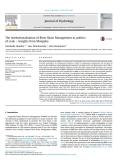Until the 1980s, deforestation in the Brazilian Amazon had largely been the result of public policies (incentives, investment). Since the 1990s, with basic infrastructure installed and cattle-ranching turned profitable due to innovations, deforestation has relied on its own endogenous dynamics. To stop this trend, politics will have to use both traditional and modern instruments for influencing economic behaviour, that is, control and sanctions as well as dialogue and negotiation. Since democratisation, civil society organisations (CSOs) have grown in the Amazon region, often with important support from foreign non-governmental organisations. Today, they are important partners for sustainable, bottom-up development strategies. This has become evident in the political mobilisation against two large public infrastructure investment projects: the dam and hydroelectric plant of Belo Monte; and the paving of the federal highway BR-163 between Cuiabá and Santarém.
The part played by the Brazilian tropical timber industry in deforesting the Amazon region has not been studied very much. This book describes the expansion of the timber industry in the Brazilian federal state of Para since the 1960s, when Amazon development became an important item on the government's agenda.
Efforts to control atmospheric accumulations of greenhouse gases that threaten to heat up the planet are in their infancy. Although the IMF is not an environmental organization, environmental issues matter for the organization's mission when they have major implications for macroeconomic performance and fiscal policy. Climate change clearly passes both these tests. This volume provides practical guidelines for the design of fiscal policies (carbon taxes and emissions trading systems with allowance auctions) to reduce greenhouse gases. Not only are these instruments potentially the most effective at exploiting emission reduction opportunities in the near and longer term, but they can also generate for many countries a valuable new source of government revenue. The chapters, written by leading experts, explain the case for fiscal policies over other approaches; how these policies can be implemented; reasonable levels for emissions prices; policies for the forest sector; appropriate policy for developing countries; the most promising fiscal instruments for climate finance; and lessons to be drawn from prior policy experience.
This paper, prepared at the request of G20 Finance Ministers, explores options to scale up finance for climate change adaptation and mitigation in developing countries. The paper looks into sources of public finance, including carbon-linked fiscal instruments as well as other sources of revenues; policies and instruments to leverage private and multinational flows, including carbon markets, other instruments to engage private finance and multilateral development bank leverage; and concludes by monitoring and tracking climate finance flows.

River Basin Management (RBM) as an approach to sustainable water use has become the dominant model of water governance. Its introduction, however, entails a fundamental realignment and rescaling of water-sector institutions along hydrological boundaries. Creating such a new governance scale is inherently political, and is being described as politics of scale. This paper analyzes how the politics of scale play out in the institutionalization of RBM in Mongolia. It furthermore scrutinizes the role of the broader political decentralization process in the introduction of RBM, an issue that has so far received little attention. Finally, it assesses whether the river basin is an adequate water management scale in Mongolia.
